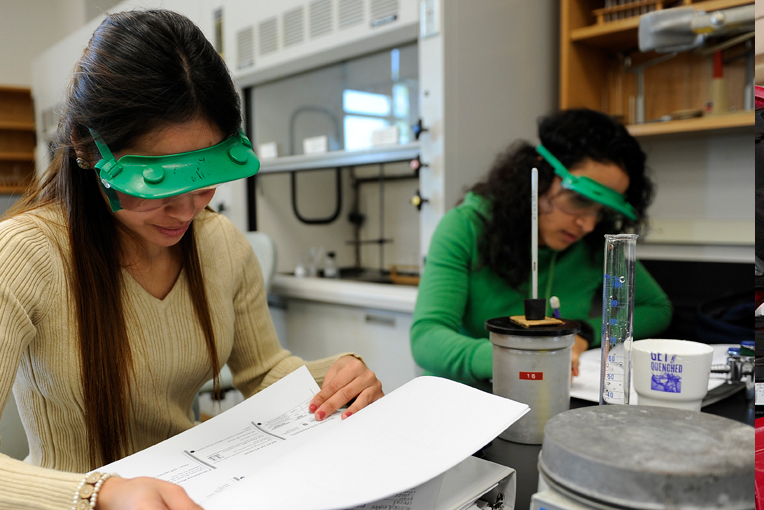Biomanufacturing
In this Biomanufacturing program, students will gain key knowledge, skills, and abilities needed to work in the Biomanufacturing industry, which uses biological systems to produce biofuels, vaccines, pharmaceutical drugs, and other therapeutic agents.

Science, Technology, Engineering, and Math Guided Pathway Division
Students learn both basic and advanced techniques in biotechnology and biomanufacturing such as genetic engineering, cell culture, chromatography including HPLC, and biochemical analysis as well as how to do technical writing, approaches to quality in the biomanufacturing industry, and requirements to work in a regulated environment. This program will train students to work as in a variety of jobs, including bioprocessing technicians, research and development lab technicians, and quality control/quality assurance associates.
Program Learning Outcomes
Upon successful completion of the degree program, students will be able to:
- Perform a technical laboratory task common to the biomanufacturing industry by utilizing the appropriate instruments or equipment safely and effectively.
Certificates of Achievement
Biomanufacturing Technician
Goals and objectives must address a valid occupational, basic skills, civic education, or lifelong learning purpose. For the purposes of Chancellor’s Office submission and approval, programs may select one of two program goals: CTE or local. CTE is limited to certificates in a vocational TOP Code. Local is used for all other certificates but may include certificates designed to prepare students for transfer.
Program Learning Outcomes: Upon successful completion of the degree program, students will be able to:
- Evaluate the most appropriate strategy to purify a given protein based on its biochemical properties.
Biotechnology Laboratory Assistant
The Biotechnology Laboratory Assistant Certificate of Achievement prepares students with the technical skills needed to work in a biotech laboratory. Students in this program receive hands on training in basic laboratory skills including preparation of buffers and other reagents, proper documentation, DNA manipulation, enzymatic assays, protein separation methods, antibody-based methods, and data collection. This program emphasizes cell and molecular biology techniques such as culturing and manipulating both bacterial and mammalian cells using genetic engineering as well as performing protein purification and analysis. This program is ideal for students who want to gain the technical expertise to work effectively in a bioscience laboratory in a supportive role like a laboratory assistant.
Program Learning Outcomes:
- Develop a cloning strategy to insert a gene of interest into a given DNA plasmid.
Majors Preparation Work Sheets
Contact Information
Gerson Valle
Dean of Student Learning
gvalle@compton.edu
(310) 900-1600, ext 2727
Division Chair
Dr. Jose Villalobos
jvillalobos@compton.edu
(310) 900- 1600, Ext. 2424
General Science Faculty
Fazal Aasi, M.D.
faasi@compton.edu
(310) 900-1600, ext. 2316
Emma Adams, D.V.M.
eadams@compton.edu
Karla Coti, Ph.D.
kcoti@compton.edu
(310) 900-1600, ext. 2317
Hassan Elfarissi
helfarissi@compton.edu
(310) 900-1600, ext. 2311
Katherine Marsh, Ph.D.
kmarsh@compton.edu
(310) 900-1600 ext. 2438
MS, Room- 113
Schetema Nealy, Ph.D.
snealy@compton.edu
Kent Schwitkis, Ph.D.
kschwitkis@compton.edu
(310) 900-1600, ext. 2423
MS, Room 124
Ayesha Sirajuddin, Ph.D.
asirajuddin@compton.edu
(310) 900-1600, ext. 2422
Eyob Wallano, D.V.M.
ewallano@compton.edu
(310) 900-1600, ext.2425



We're Here to Help! Create Your Success Story at Compton College.
START HERE




